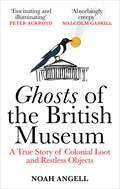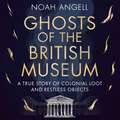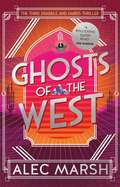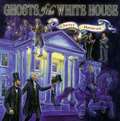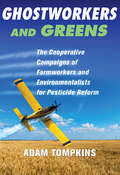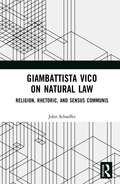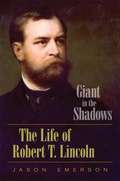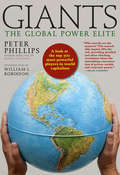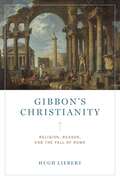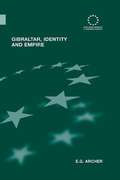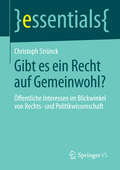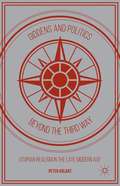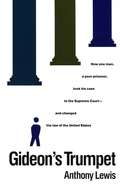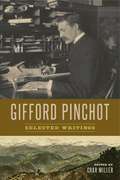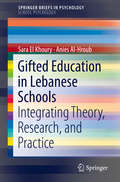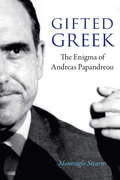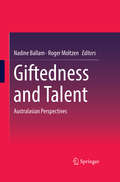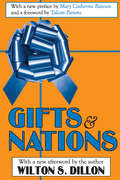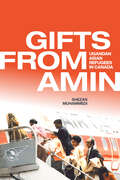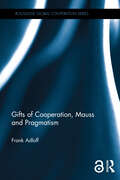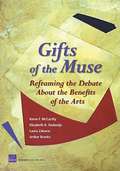- Table View
- List View
Ghosts of the British Museum: A True Story of Colonial Loot and Restless Objects
by Noah Angell'An absorbingly creepy travelogue through the corridors, tunnels and basements of our most famous cultural repository. With Noah Angell as our guide, the British Museum becomes a haunted prison filled with imperial plunder and restless spirits clamouring for attention.' - Malcolm Gaskill, author of The Ruin Of All Witches'Fascinating and illuminating' - Peter Ackroyd'Brilliantly delicate, pointed, shivery... You could read it as a guide to which galleries to avoid - or to where the push for repatriation should be most urgent.' - Erin L. Thompson, professor of art crime at the City University of New York'Achieves a near-impossible marriage between paranormal pop-culture, folklore and hauntology' - Roger Clarke, author of A Natural History of Ghosts'A heady cocktail of history and folklore that leaves a haunting aftertaste... Spine-tingling' - Lindsey Fitzharris, New York Times bestselling author of The FacemakerWhat if the British Museum isn't a carefully ordered cross section of history but is in instead a palatial trophy cabinet of colonial loot - swarming with volatile and errant spirits?When artist and writer Noah Angell first heard murmurs of ghostly sightings at the British Museum he had to find out more. What started as a trickle soon became a deluge as staff old and new - from overnight security to respected curators - brought him testimonies of their supernatural encounters.It became clear that the source of the disturbances was related to the Museum's contents - unquiet objects, holy plunder, and restless human remains protesting their enforced stay within the colonial collection's cabinets and deep underground vaults. According to those who have worked there, the institution is heaving with profound spectral disorder.Ghosts of the British Museum fuses storytelling, folklore and history, digs deep into our imperial past and unmasks the world's oldest national museum as a site of ongoing conflict, where restless objects are held against their will.It now appears that the objects are fighting back.
Ghosts of the British Museum: A True Story of Colonial Loot and Restless Objects
by Noah Angell'An absorbingly creepy travelogue through the corridors, tunnels and basements of our most famous cultural repository. With Noah Angell as our guide, the British Museum becomes a haunted prison filled with imperial plunder and restless spirits clamouring for attention.' - Malcolm Gaskill, author of The Ruin Of All Witches'Fascinating and illuminating' - Peter Ackroyd'Brilliantly delicate, pointed, shivery... You could read it as a guide to which galleries to avoid - or to where the push for repatriation should be most urgent.' - Erin L. Thompson, professor of art crime at the City University of New York'Achieves a near-impossible marriage between paranormal pop-culture, folklore and hauntology' - Roger Clarke, author of A Natural History of Ghosts'A heady cocktail of history and folklore that leaves a haunting aftertaste... Spine-tingling' - Lindsey Fitzharris, New York Times bestselling author of The FacemakerWhat if the British Museum isn't a carefully ordered cross section of history but is in instead a palatial trophy cabinet of colonial loot - swarming with volatile and errant spirits?When artist and writer Noah Angell first heard murmurs of ghostly sightings at the British Museum he had to find out more. What started as a trickle soon became a deluge as staff old and new - from overnight security to respected curators - brought him testimonies of their supernatural encounters.It became clear that the source of the disturbances was related to the Museum's contents - unquiet objects, holy plunder, and restless human remains protesting their enforced stay within the colonial collection's cabinets and deep underground vaults. According to those who have worked there, the institution is heaving with profound spectral disorder.Ghosts of the British Museum fuses storytelling, folklore and history, digs deep into our imperial past and unmasks the world's oldest national museum as a site of ongoing conflict, where restless objects are held against their will.It now appears that the objects are fighting back.
Ghosts of the British Museum: A True Story of Colonial Loot and Restless Objects
by Noah Angell'An absorbingly creepy travelogue through the corridors, tunnels and basements of our most famous cultural repository. With Noah Angell as our guide, the British Museum becomes a haunted prison filled with imperial plunder and restless spirits clamouring for attention.' - Malcolm Gaskill, author of The Ruin Of All Witches'Fascinating and illuminating' - Peter Ackroyd'Brilliantly delicate, pointed, shivery... You could read it as a guide to which galleries to avoid - or to where the push for repatriation should be most urgent.' - Erin L. Thompson, professor of art crime at the City University of New York'Achieves a near-impossible marriage between paranormal pop-culture, folklore and hauntology' - Roger Clarke, author of A Natural History of Ghosts'A heady cocktail of history and folklore that leaves a haunting aftertaste... Spine-tingling' - Lindsey Fitzharris, New York Times bestselling author of The FacemakerWhat if the British Museum isn't a carefully ordered cross section of history but is in instead a palatial trophy cabinet of colonial loot - swarming with volatile and errant spirits?When artist and writer Noah Angell first heard murmurs of ghostly sightings at the British Museum he had to find out more. What started as a trickle soon became a deluge as staff old and new - from overnight security to respected curators - brought him testimonies of their supernatural encounters.It became clear that the source of the disturbances was related to the Museum's contents - unquiet objects, holy plunder, and restless human remains protesting their enforced stay within the colonial collection's cabinets and deep underground vaults. According to those who have worked there, the institution is heaving with profound spectral disorder.Ghosts of the British Museum fuses storytelling, folklore and history, digs deep into our imperial past and unmasks the world's oldest national museum as a site of ongoing conflict, where restless objects are held against their will.It now appears that the objects are fighting back.
Ghosts of the West: Don't miss the new action-packed Drabble and Harris thriller!
by Alec MarshThis third novel in the Dabble and Harris thrillers is perfect for fans of action-packed, historical fiction.'A rollicking good read' IAN RANKINWhen daring journalist Sir Percival Harris gets wind of a curious crime in a sleepy English town, he ropes in his old friend Professor Ernest Drabble to help him investigate.The crime is a grave robbery, and as Drabble and Harris pry deeper, events take a mysterious turn when a theft at the British Museum is soon followed by a murder.The friends are soon involved in a tumultuous quest that takes them from the genteel streets of London to the wide plains of the United States. What exactly is at stake is not altogether clear - but if they don't act soon, the outcome could be a bloody conflict, one that will cross borders, continents and oceans...Meanwhile, can Drabble and Harris's friendship - which has endured near-death experiences on several continents, not to mention a boarding school duel - survive a crisis in the shape of the beautiful and enigmatic Dr Charlotte Moore?Praise for Alec Marsh's Drabble and Harris thrillers...'An immensely readable treat!'ALEXANDER MCCALL SMITH'Told with humour and flair, Enemy of the Raj is a highly enjoyable, riveting read'ABIR MUKHERJEE'A thoroughly engaging and enjoyable diversion'NEW STATESMAN on Enemy of the Raj'Tremendous stuff! With the arrival of Alec Marsh's first Drabble and Harris thriller, John Buchan must be stirring uneasily in his grave'STANLEY JOHNSON
Ghosts of the West: Don't miss the new action-packed Drabble and Harris thriller!
by Alec MarshThis third novel in the Dabble and Harris thrillers is perfect for fans of action-packed, historical fiction.'A rollicking good read' IAN RANKINWhen daring journalist Sir Percival Harris gets wind of a curious crime in a sleepy English town, he ropes in his old friend Professor Ernest Drabble to help him investigate.The crime is a grave robbery, and as Drabble and Harris pry deeper, events take a mysterious turn when a theft at the British Museum is soon followed by a murder.The friends are soon involved in a tumultuous quest that takes them from the genteel streets of London to the wide plains of the United States. What exactly is at stake is not altogether clear - but if they don't act soon, the outcome could be a bloody conflict, one that will cross borders, continents and oceans...Meanwhile, can Drabble and Harris's friendship - which has endured near-death experiences on several continents, not to mention a boarding school duel - survive a crisis in the shape of the beautiful and enigmatic Dr Charlotte Moore?Praise for Alec Marsh's Drabble and Harris thrillers...'An immensely readable treat!'ALEXANDER MCCALL SMITH'Told with humour and flair, Enemy of the Raj is a highly enjoyable, riveting read'ABIR MUKHERJEE'A thoroughly engaging and enjoyable diversion'NEW STATESMAN on Enemy of the Raj'Tremendous stuff! With the arrival of Alec Marsh's first Drabble and Harris thriller, John Buchan must be stirring uneasily in his grave'STANLEY JOHNSON
Ghosts of the White House
by Cheryl HarnessGeorge Washington's ghost pulls a girl out of her school White House tour and takes her on a personal tour of the building, introducing her to the ghosts of previous presidents and to the history of the White House and the United States.
Ghostworkers and Greens: The Cooperative Campaigns of Farmworkers and Environmentalists for Pesticide Reform
by Adam TompkinsThroughout the twentieth century, despite compelling evidence that some pesticides posed a threat to human and environmental health, growers and the USDA continued to favor agricultural chemicals over cultural and biological forms of pest control. In Ghostworkers and Greens, Adam Tompkins reveals a history of unexpected cooperation between farmworker groups and environmental organizations. Tompkins shows that the separate movements shared a common concern about the effects of pesticides on human health. This enabled bridge-builders within the disparate organizations to foster cooperative relationships around issues of mutual concern to share information, resources, and support. Nongovernmental organizations, particularly environmental organizations and farmworker groups, played a key role in pesticide reform. For nearly fifty years, these groups served as educators, communicating to the public scientific and experiential information about the adverse effects of pesticides on human health and the environment, and built support for the amendment of pesticide policies and the alteration of pesticide use practices. Their efforts led to the passage of more stringent regulations to better protect farmworkers, the public, and the environment. Environmental organizations and farmworker groups also acted as watchdogs, monitoring the activity of regulatory agencies and bringing suit when necessary to ensure that they fulfilled their responsibilities to the public. These groups served as not only lobbyists but also essential components of successful democratic governance, ensuring public participation and more effective policy implementation.
Giambattista Vico on Natural Law: Rhetoric, Religion and Sensus Communis
by John SchaefferThis book introduces the thought of Giambattista Vico (1668-1744) into the discussion about natural law. For many critics, natural law is not natural but a façade behind which lurks the supernatural – that is, revealed religion. While current notions of natural law are based on either Aristotelian/Thomistic principles or on Enlightenment rationalism, the book shows how Vico was the only natural law thinker to draw on the Roman legal tradition, rather than on Greek or Enlightenment philosophy. Specifically, the book addresses how Vico, drawing his inspiration from Roman history, incorporated both rhetoric and religion into a dynamic concept of natural law grounded in what he called the sensus communis: the entire repertoire of values, images, institutions, and even prejudices that a community takes for granted. Vico denied that natural law could ever furnish a definitive answer to moral problems in the social/public sphere. Rather he maintained that such problems had to be debated in the wider arena of the sensus communis. For Vico, as this book argues, natural law principles emerged from these debates; they did not resolve them.
Giant in the Shadows: The Life of Robert T. Lincoln
by Jason EmersonAlthough he was Abraham and Mary Lincoln’s oldest and last surviving son, the details of Robert T. Lincoln’s life are misunderstood by some and unknown to many others. Nearly half a century after the last biography about Abraham Lincoln’s son was published, historian and author Jason Emerson illuminates the life of this remarkable man and his achievements in Giant in the Shadows: The Life of Robert T. Lincoln. Emerson, after nearly ten years of research, draws upon previously unavailable materials to offer the first truly definitive biography of the famous lawyer, businessman, and statesman who, much more than merely the son of America’s most famous president, made his own indelible mark on one of the most progressive and dynamic eras in United States history. Born in a boardinghouse but passing his last days at ease on a lavish country estate, Robert Lincoln played many roles during his lifetime. As a president’s son, a Union soldier, an ambassador to Great Britain, and a U.S. secretary of war, Lincoln was indisputably a titan of his age. Much like his father, he became one of the nation’s most respected and influential men, building a successful law practice in the city of Chicago, serving shrewdly as president of the Pullman Car Company, and at one time even being considered as a candidate for the U.S. presidency. Along the way he bore witness to some of the most dramatic moments in America’s history, including Robert E. Lee’s surrender at Appomattox Courthouse; the advent of the railroad, telephone, electrical, and automobile industries; the circumstances surrounding the assassinations of three presidents of the United States; and the momentous presidential election of 1912. Giant in the Shadows also reveals Robert T. Lincoln’s complex relationships with his famous parents and includes previously unpublished insights into their personalities. Emerson reveals new details about Robert’s role as his father’s confidant during the brutal years of the Civil War and his reaction to his father’s murder; his prosecution of the thieves who attempted to steal his father’s body in 1876 and the extraordinary measures he took to ensure it would never happen again; as well as details about the painful decision to have his mother committed to a mental facility. In addition Emerson explores the relationship between Robert and his children, and exposes the actual story of his stewardship of the Lincoln legacy—including what he and his wife really destroyed and what was preserved. Emerson also delves into the true reason Robert is not buried in the Lincoln tomb in Springfield but instead was interred at Arlington National Cemetery. Meticulously researched, full of never-before-seen photographs and new insight into historical events, Giant in the Shadows is the missing chapter of the Lincoln family story. Emerson’s riveting work is more than simply a biography; it is a tale of American achievement in the Gilded Age and the endurance of the Lincoln legacy.
Giants: The Global Power Elite
by Peter PhillipsA look at the top 300 most powerful players in world capitalism, who are at the controls of our economic future.Who holds the purse strings to the majority of the world's wealth? There is a new global elite at the controls of our economic future, and here former Project Censored director and media monitoring sociologist Peter Phillips unveils for the general reader just who these players are. The book includes such power players as Mark Zuckerberg, Bill Gates, Jeff Bezos, Jamie Dimon, and Warren Buffett. As the number of men with as much wealth as half the world fell from sixty-two to just eight between January 2016 and January 2017, according to Oxfam International, fewer than 200 super-connected asset managers at only 17 asset management firms—each with well over a trillion dollars in assets under management—now represent the financial core of the world's transnational capitalist class. Members of the global power elite are the management—the facilitators—of world capitalism, the firewall protecting the capital investment, growth, and debt collection that keeps the status quo from changing. Each chapter in Giants identifies by name the members of this international club of multi-millionaires, their 17 global financial companies—and including NGOs such as the Group of Thirty and the Trilateral Commission—and their transnational military protectors, so the reader, for the first time anywhere, can identify who constitutes this network of influence, where the wealth is concentrated, how it suppresses social movements, and how it can be redistributed for maximum systemic change.
Gibbon’s Christianity: Religion, Reason, and the Fall of Rome
by Hugh LiebertThere has never been much doubt about the faith of the “infidel historian” Edward Gibbon. But for all of Gibbon’s skepticism regarding Christianity’s central doctrines, the author of The History of the Decline and Fall of the Roman Empire did not merely seek to oppose Christianity; he confronted it as a philosophical and historical puzzle. Gibbon’s Christianity tallies the results and conditions of that confrontation.Using rich correspondence, private journals, early works, and memoirs that were never completed, Hugh Liebert provides intimate access to Gibbon’s life in order to better understand his complex relationship with religion. Approaching the Decline and Fall from the context surrounding its conception, Liebert shows how Gibbon adapted explanations of the Roman republic’s rise to account for a new spiritual republic and, subsequently, the rise of modern Europe. Taken together, Liebert’s analysis of this context, including the nuance of Gibbon’s relationship to Christianity, and his readings of Gibbon’s better- and lesser-known texts suggest a historian more eager to comprehend Christianity’s worldly power than to sneer at or dismiss it.Eminently readable and wholly accessible to anyone interested in or familiar with the Decline and Fall, this groundbreaking reassessment of Gibbon’s most famous work will appeal especially to scholars of eighteenth-century studies.
Gibraltar, Identity and Empire (Routledge Advances in European Politics #33)
by E.G. ArcherThe principal argument in Gibraltar and Empire is that Gibraltarians constitute a separate and distinctive people, notwithstanding the political stance taken by the government of Spain. Various factors - environmental, ethnic, economic, political, religious, linguistic, educational and informal - are adduced to explain the emergence of a sense of community on the Rock and an attachment to the United Kingdom. A secondary argument is that the British empire has left its mark in Gibraltar in various forms - such as militarily - and for a number of reasons. Gilbraltar and Empire's exploration of the manifold reasons why the Gibraltarians have bucked the trend in the history of decolonization comes at a time when the issues in question have come to the fore in diplomatic and political areas.
Gibraltar: British or Spanish? (Routledge Advances in European Politics #Vol. 19)
by Peter GoldThe year 2004 marks three hundred years since Britain took possession of Gibraltar, a rocky promontory at the foot of the Iberian Peninsula sometimes referred to as 'The Rock'. Gibraltar: British or Spanish? provides a detailed study of the attempts that have been made by Spain, especially since 1984 when Britain and Spain signed an agreement to discuss the future of Gibraltar, to regain the sovereignty of 'The Rock', despite the wishes of the Gibraltarians.
Gibt es ein Recht auf Gemeinwohl?: Öffentliche Interessen im Blickwinkel von Rechts- und Politikwissenschaft (essentials)
by Christoph StrünckPolitikwissenschaftliche Pluralismustheorien betrachten Gemeinwohl als Resultat politischer Kompromisse. Solche prozeduralen Konzepte finden sich auch in der Rechtswissenschaft, wenn es darum geht, allgemeinen und schwachen Interessengruppen besondere Klagerechte einzuräumen. Allerdings müssen Gerichte in ihren Urteilen inhaltlich begründen, inwiefern mit solchen Klagen öffentliche Interessen gewahrt werden. Am Beispiel des Verbraucherschutzes erläutert der Autor, warum moderne Pluralismuskonzepte auch solche inhaltlichen Gemeinwohlbestimmungen in die Analyse der Interessenvermittlung einbeziehen sollten.
Giddens and Politics beyond the Third Way: Utopian Realism In The Late Modern Age
by Peter KolarzAssessing the political dimensions of Anthony Giddens' work from the 1970s to the present, this book highlights new directions for politics distinct from his Third Way. Kolarz provides an assessment of Giddens' political relevance and utility for present-day political endeavours, reflecting on the approach to critical social theory found in his early work, notably his theory of structuration and critique of historical materialism, and his consequent utopian realist analysis of late modernity. Giddens and Politics beyond the Third Way extracts from his work a rationale for global redistributive action, as well as an integrative approach to policymaking, suggesting that coherence of centre-left emancipatory politics requires coordination of policy areas previously thought of as separate.
Gideon's Trumpet
by Anthony R. LewisRecounts the true story of a prisoner who went to the supreme court in order to insure his right to legal representation.
Gifford Pinchot: Selected Writings (Pioneers Of Conservation Ser.)
by Char Miller Gifford PinchotThe founding chief of the U.S. Forest Service and twice governor of Pennsylvania, Gifford Pinchot was central to the early twentieth-century conservation movement in the United States and the political history and evolution of the Keystone State. This collection of Pinchot’s essays, articles, and letters reveals a gifted public figure whose work and thoughts on the environment, politics, society, and science remain startlingly relevant today. A learned man and admirably accessible writer, Pinchot showed keen insight on issues as wide-ranging as the rights of women and minorities, war, education, Prohibition, agricultural policy, land use, and the craft of politics. He developed galvanizing arguments against the unregulated exploitation of natural resources, made a clear case for thinking globally but acting locally, railed at the pernicious impact of corporate power on democratic life, and firmly believed that governments were obligated to enhance public health, increase economic opportunity, and sustain the land. Pinchot’s policy accomplishments—including the first clean-water legislation in Pennsylvania and the nation—speak to his effectiveness as a communicator and a politician. His observations on environmental issues were exceptionally prescient, as they anticipated the dilemmas currently confronting those who shape environmental public policy.Introduced and annotated by environmental historian Char Miller, this is the only comprehensive collection of Pinchot’s writings. Those interested in the history of conservation, the Gilded Age and Progressive Era, American politics, and the Commonwealth of Pennsylvania will find this book invaluable.
Gifted Education in Lebanese Schools: Integrating Theory, Research, And Practice (SpringerBriefs in Psychology)
by Anies Al-Hroub Sara El KhouryThis Brief discusses research about gifted education in Lebanese schools. It provides an overview of the latest theories, definitions, and practices used to identify gifted students in Lebanese schools. Chapters begin by providing background information on the status of gifted education in Lebanon and the challenges gifted Lebanese children face. Subsequent chapters discuss recent and relevant international definitions of giftedness as well as common misconceptions and underrepresentation of giftedness. The Brief presents research study findings on the cultural definition of giftedness in the minds of Lebanese teachers. It also presents findings on current practices used to identify gifted learners in Lebanese schools. It concludes with recommendations from the teachers that participated in the reported study as well as the authors’ proposal for a Lebanese elementary school policy for identification of gifted students. Gifted Education in Lebanese Schools is an informative resource for researchers, professionals, practitioners, and graduate students in the field of school psychology, educational psychology, gifted and special education, and social work.
Gifted Greek: The Enigma of Andreas Papandreou
by Monteagle StearnsGifted Greek is a reflection on twentieth-century Greek history and politics, as well as a character study of its first socialist prime minister, Andreas Papandreou. Monteagle Stearns witnessed the transformation of Papandreou from an affable American economist to a stormy, anti-American Greek, over Stearns&’s three diplomatic assignments to Athens, the last as a U.S. ambassador. The unresolved dispute over how and by whom Greece should be governed parallels the equally unresolved issues between Papandreou and his estranged father, George. Andreas, who left Greece in 1940, became a naturalized American citizen and a twenty-year resident of the United States. In contrast, George was thoroughly Greek: a flamboyant, republican-leaning politician, a one-time prime minister, and a perennial leader of Greece&’s Liberal Party. Stearns arrived in Athens as a diplomat in early 1958, in the thick of Greece&’s political turmoil. Over the next five years, he came to know first George Papandreou and then his son, Andreas. As neighbors in suburban Athens, as fellow Americans, and as like-minded critics of the problems still afflicting postwar Greece, Stearns and Andreas quickly established a warm friendship. Over the decades, however, that friendship was tested and frayed. Gifted Greek is a reflection on the Cold War era, on its impact on Greece, and on Andreas himself—whose dual nature had long fascinated the author and led to this account of their curiously entwined professional and personal lives.
Giftedness and Talent
by Nadine Ballam Roger MoltzenThis book brings together recent postgraduate research in the broad area of giftedness, talent development and gifted education conducted across New Zealand and Australia. It addresses the significant demand for research in the field undertaken outside the United States and offers valuable practical insights. Divided into 14 chapters, the book explores giftedness and talent in a diverse range of socioeconomic cohorts and contexts, including examinations of gender, race and ethnicity. Though primarily intended for practitioners, it will also benefit undergraduate and postgraduate students, researchers and educators in New Zealand, Australia and beyond.
Gifts and Nations: The Obligation to Give, Receive and Repay
by Wilton S. DillonWhat can men in industrial nations learn from their "primitive" contemporaries, and the habits of earlier civilizations? This book by acclaimed cultural anthropologist Wilton S. Dillon suggests that modern political, religious, and scientific communities--and alliances--would be enhanced greatly if we understood how gift exchange and reciprocity helped to balance earlier institutions and societies.Using the example of the gift behavior of France and the United States during the Marshall Plan period, Gifts and Nations examines the troubles that arise between donors and recipients when a generous donor remains innocent of the recipient's desire to give back things or ideas to which both attach value. Such innocence may produce what the author calls "the Gaullist effect"--a quest for self-esteem, autonomy, and initiative by a person, or a nation, who feels burdened and controlled by undischarged obligations.Gifts and Nations is very much an historical footnote to the rise of PaxAmericana--the American empire having been launched in 1898, enlarged in the aftermath of World War II and the Cold War, and now the subject of global debate. This volume emphasizes that building coalitions and keeping alliances strong require multi-lateralism based on reciprocity.
Gifts from Amin: Ugandan Asian Refugees in Canada (Studies in Immigration and Culture #18)
by Shezan MuhammediIn August 1972, military leader and despot Idi Amin expelled Asian Ugandans from the country, professing to return control of the economy to “Ugandan citizens.” Within ninety days, 50,000 Ugandans of South Asian descent were forced to leave and seek asylum elsewhere; nearly 8,000 resettled in Canada. This major migration event marked the first time Canada accepted a large group of predominantly Muslim, non-European, non-white refugees. Shezan Muhammedi’s Gifts from Amin documents how these women, children, and men—including doctors, engineers, business leaders, and members of Muhammedi’s own family—responded to the threat in Uganda and rebuilt their lives in Canada. Building on extensive archival research and oral histories, Muhammedi provides a nuanced case study on the relationship between public policy, refugee resettlement, and assimilation tactics in the twentieth century. He demonstrates how displaced peoples adeptly maintain multiple regional, ethnic, and religious identities while negotiating new citizenship. Not passive recipients of international aid, Ugandan Asian refugees navigated various bureaucratic processes to secure safe passage to Canada, applied for family reunification, and made concerted efforts to integrate into—and give back to—Canadian society, all the while reshaping Canada’s refugee policies in ways still evident today. As the numbers of forcibly displaced people around the world continue to rise, Muhammedi’s analysis of policymaking and refugee experience is eminently relevant. The first major oral history project dedicated to the stories of Ugandan Asian refugees in Canada, Gifts from Amin explores the historical context of their expulsion from Uganda, the multiple motivations behind Canada’s decision to admit them, and their resilience over the past fifty years.
Gifts of Cooperation, Mauss and Pragmatism (Routledge Global Cooperation Series)
by Frank AdloffThis book focuses on the contribution of Marcel Mauss (1872-1950) to social theory and a theory of cooperation. It shows that Mauss’s essay "The Gift" (1925) can be seen as a classic of a pragmatist, interactionist and anti-utilitarian sociology. It critiques the dichotomy of self-interest and normatively orientated action that forms the basis of sociology. This conceptual dichotomization has caused forms of social interaction (that cannot be localized either on the side of self-interest or on that of morality) to be overlooked or taken little notice of. The book argues that it is the logic of the gift and its reciprocity that accompany and structure all forms of interaction, from the social micro to the macro-level. It demonstrates that in modern societies agonistic and non-agonistic gifts form their own orders of interaction. This book uniquely establishes the paradigm of the gift as the basis for a theory of interaction. It will be of great interest to researchers and postgraduates in social theory, cultural theory, political sociology and global cooperation, anthropology, philosophy and politics.
Gifts of Cooperation, Mauss and Pragmatism (Routledge Global Cooperation Series)
by Frank AdloffThis book focuses on the contribution of Marcel Mauss (1872-1950) to social theory and a theory of cooperation. It shows that Mauss’s essay "The Gift" (1925) can be seen as a classic of a pragmatist, interactionist and anti-utilitarian sociology. It critiques the dichotomy of self-interest and normatively orientated action that forms the basis of sociology. This conceptual dichotomization has caused forms of social interaction (that cannot be localized either on the side of self-interest or on that of morality) to be overlooked or taken little notice of. The book argues that it is the logic of the gift and its reciprocity that accompany and structure all forms of interaction, from the social micro to the macro-level. It demonstrates that in modern societies agonistic and non-agonistic gifts form their own orders of interaction. This book uniquely establishes the paradigm of the gift as the basis for a theory of interaction. It will be of great interest to researchers and postgraduates in social theory, cultural theory, political sociology and global cooperation, anthropology, philosophy and politics.
Gifts of the Muse: Reframing the Debate about the Benefits of the Arts
by Arthur Brooks Kevin F. Mccarthy Laura Zakaras Elizabeth H. OndaatjeDuring the past decade, arts advocates have relied on an instrumental approach to the benefits of the arts in arguing for support of the arts. This report evaluates these arguments and asserts that a new approach is needed. This new approach offers a more comprehensive view of how the arts create private and public value, underscores the importance of the arts?' intrinsic benefits, and links the creation of benefits to arts involvement.
